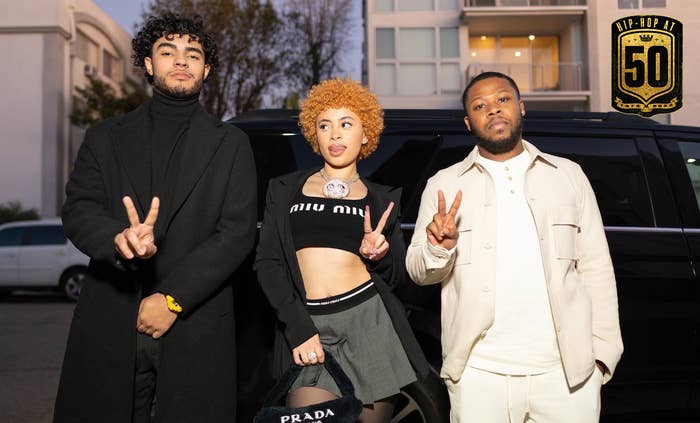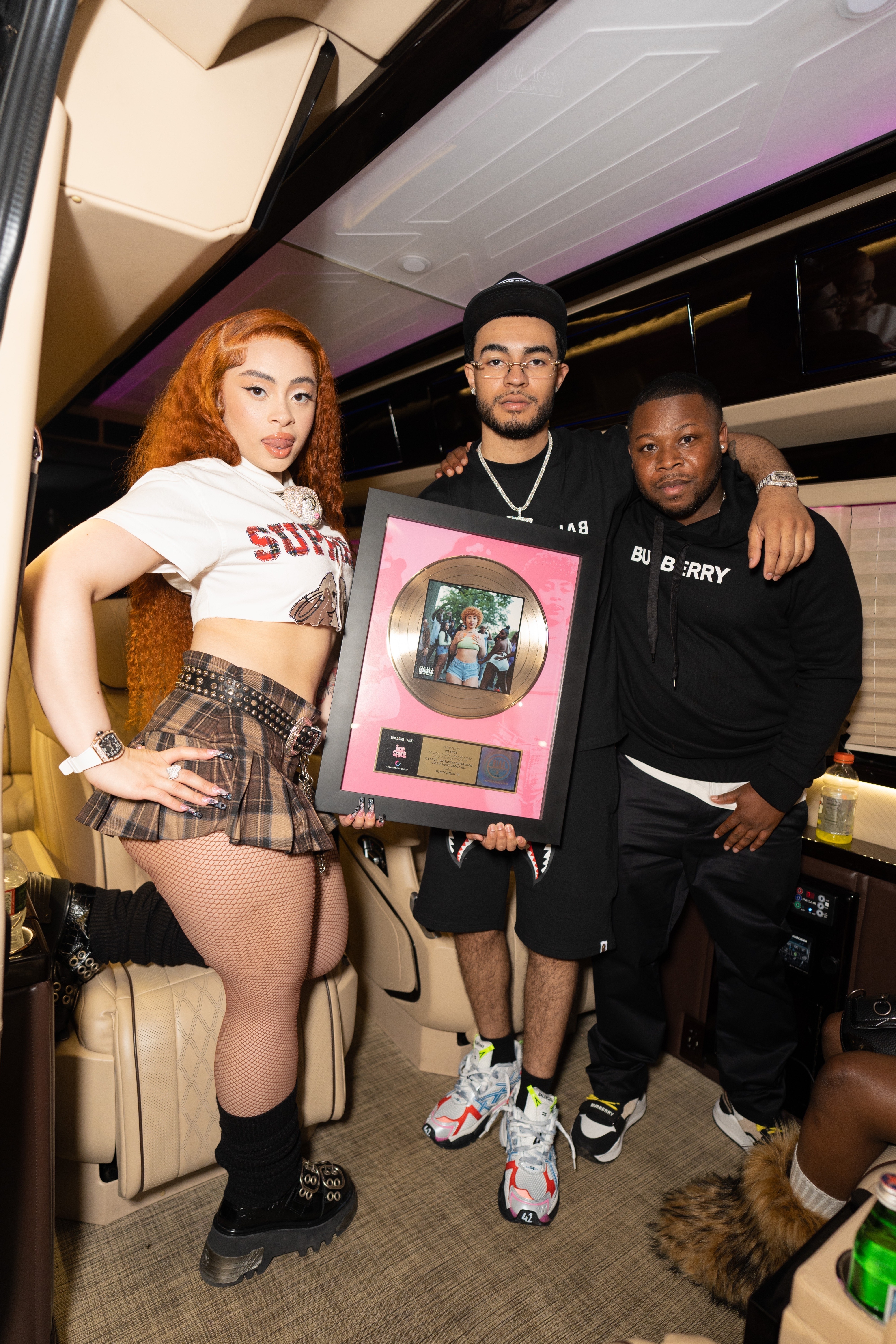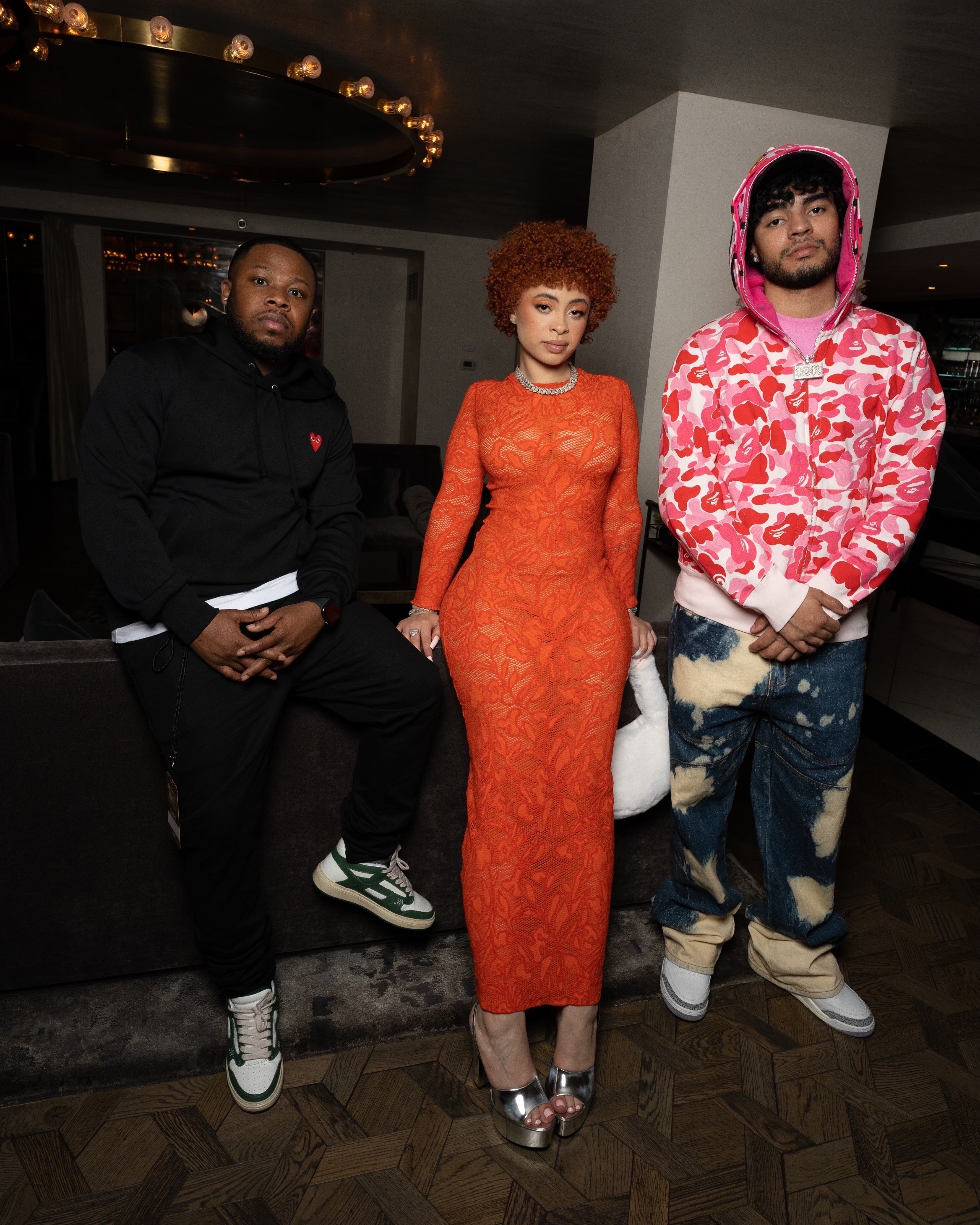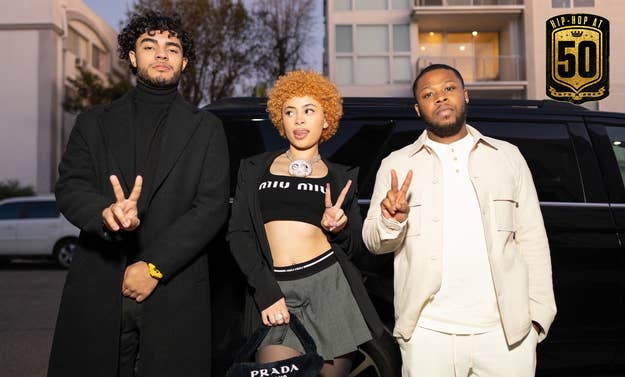
Visionaries is a conversation series with key players in the music industry who work behind the scenes to make our favorite genres the rich wells they are today.
“It’s still a young genre,” James Rosemond Jr. tells Complex. The music mogul chats with us in between award show rehearsals in LA earlier this summer. He’s based in New York, where most of his clientele is from, and is typically on site but today, he’s on a reflective walk in the entertainment capital of the world. When asked what he thinks his role is, the CEO and founder of Mastermind Artists says it’s “to protect and serve.”
After years of representing a slew of male artists and producers like Infrared and Sean Kingston, James Rosemond Jr. signed his first woman artist in March of last year, and he might as well have won the lottery. The little-known artist at the time was Ice Spice—now one of the most talked-about New York rappers.
The 31-year-old and Ice Spice met when Like..? wasn’t even as much as an idea and “Munch” had yet to catapult her into early stardom. Still, Rosemond Jr. had the vision. “I had an idea and a plan that I pitched to her. She loved what she was hearing, and we hit the ground running,” he tells Complex. Rosemond Jr., who is also the son of Jimmy Henchman (the infamous music executive who managed the likes of Gucci Mane) has over a decade of experience under his belt and has brilliantly espoused his connections to add to the reach of Spice’s talent with partnerships, collaborations and symbiotic deals that have allowed her to gain leverage and retain her power.
With a little over a year of working together, the two proudly tout an impressive list of successes that include the most number of top 5 Billboard Hot 100 hits of the year so far, and features from two of the biggest artists of our time—Nicki Minaj and Taylor Swift—both of which he says he’s largely responsible for making happen.
A little over a year into managing both Spice and her right-hand go-to producer RIOTUSA, James Rosemond Jr. looks back at their success and expands on how their vision became a reality, plus his thinking when it comes to the low moments, and more, in the conversation with Complex below.
Why don't we start by you telling us about how you connected with Ice Spice and eventually became her manager?
To sum it up, we kind of manifested each other. She was looking for a manager at the time. I was looking for a female artist. And we met back in March in New York through my producer, DJ who was managing Diablo, and she did her first studio session with him. They cut a record together, and then we stayed in touch based off of that record. And yeah, I had an idea and a plan that I pitched to her. She loved what she was hearing, and we hit the ground running.
At what point was that in her career? Were any songs out yet?
[There weren’t] a lot of monthly listeners, it wasn't a lot of followers, any of that stuff. It was only “No Clarity” and “Name of Love” that was out. This is before “Euphoric,” before the On the Radar Freestyle, and clearly before “Munch.” And what gravitated to me [is that] I love crossover artists, crossover records, and “No Clarity” [spoke] to me the most because of the sample and how they flipped it and the crossover pop sensibilities to it. So it just sounded very promising. So yeah, when we had that record, it had some decent numbers on YouTube, but it wasn't translating yet on streaming, but it was around that time. That was March of last year.
Yeah, we just published a timeline not too long ago and when I was reading through it, I'm like, "Wow, it's wild how much has happened in this past year alone for her and for you guys.” Who were some of the artists that you were working with before her?
I was working with Sean Kingston. He was managed and signed to me. I was working with a kid named Jibbs who had Chain Hang Low. I was also working with a lot of writers and producers. Infared who wrote the song “All the Way Up” for Fat Joe and a lot of other songs for him [and] Jadakiss, "Start with straight shots and then pop bottles." I was doing a lot of pub deals in the beginning of my career. So if it was with Patrick Moxy at Ultra Publishing or Larry Mestel at Primary Wave, I was just [brokering] a lot of those publishing deals for writers and producers and then evolved in managing artists.
“I was looking for a female artist… I had an idea and a plan that I pitched to her. She loved what she was hearing, and we hit the ground running.”
Beautiful. And then, was Ice the first woman who you signed?
Correct. That's the first woman artist that I manage.
There's a slew of women in New York rap right now. What is it about Ice that you think makes her different?
She's very marketable. If you look at her image, it's clear there's no one that looks like her. And I think we're in a time that you have to be unique. You have to be different. You have to be you. You got to be authentic. Because we find a lot of artists trying to carbon copy or just be the same as someone else, and that can only get you so far. So with me, I love partnering up with or managing artists that is allowing me to touch an untapped market in some way, shape, or form. And with her being Afro-Latina with the curly hair, with the tone that already had a record that I loved and I heard other unreleased records. It was definitely a lot of potential there, and I felt like I could add value with my political capital and network and bring them to the table to accelerate that growth.
What's something that you've seen come to fruition from that pitch package that you are seeing today that you're most proud of or can think back on and pat yourself a little bit about?
From the jump, it was about empowering her. For her to own her creative, for her to [have] credibility as an artist. Because in the beginning, it wasn't her as an artist yet. It was her as an influencer, especially on Twitter. So it was to be able to transform that into getting that credibility of her as an artist and things like that. So I think we did a great job of doing that. If it's through these different DSP platforms. Spotify, Apple, et cetera. It was really just to give light and that credibility of her being that true artist that I think I seen in her. And we wanted the world to see that in her and not just a Twitter or TikTok influencer. So she's music first, and I think we did a great job of not boxing her in, making sure she wasn't boxed in as an influencer. And as you know, it's hard for that to translate into music the way it's doing now. So I think we did a great job doing that.

You touched on a few things that I wanted to touch on, including that deal. I think many people have been highly impressed by y'all's collective avoidance of the 360 deal and the fact that Ice managed to retain her publishing rights and masters. Tell me about the fight to have those things play out the way that they did, if it was a fight at all.
Yeah, you said it. It wasn't a fight because just my experience, it was we need to roll out a record independently, strategically to have leverage. Once you have leverage, you could pretty much ask for what you want. Now, some labels will give it. Some not. Some will try to meet in the middle, but that's why we was able to make our rounds and be able to pick during the bidding war to get the best deal. We had leverage at the time. “Munch” was going crazy, the video was going crazy. So yeah, we strategically positioned the song for us to be in a position for her to be empowered to have masters and the publishing and be in a deal that's not taking everything from her in a 360 perspective. No merch, no brand deals, any of that.
"We're in a time that you have to be unique. You have to be different. You have to be you. You got to be authentic. Because we find a lot of artists trying to carbon copy."
Were there a lot of nos before you got that yes on the deal you wanted?
I don't think there was a lot of nos. I think prior to putting out “Munch,” [I had] her meet a few executives. And my thing is always educating the artists so they can see the difference. So in my head, it's like, "Yeah, we can go take these meetings prior to rolling out a record and having a record blowing up and allowing her to see the difference in the conversation." So we did get nos. It wasn't even nos. It was "We'll talk to the team and get back to you," kind of conversations.
So once we did two or three of those, she seen that, and then that's prior to us rolling out “Munch.” Then we go and roll out “Munch,” and it wasn't us going to them––they coming to us at that point. And now the conversation is totally different, even from the same people who said, "Let me get back to you and we'll talk to the team," that conversation is, "How can we sign in 24 hours? Where do you like to eat?" So it's having her be educated to see the difference. It’s day and night when you put out a [strong] record and work it compared to trying to go to them and asking for a situation.
Yeah, I can imagine. And then speaking of credibility, because that's something you touched on earlier too, I think there was the question of how far she would go after “Munch,” and that performance at Rolling Loud. So what do you say to her when are rough moments or moments of uncertainty?
Once again, it comes down to having real conversations, but I think it's also managing expectations. And part of that conversation is like, "Look, ‘Munch’ blew up so fast. There has to be time for development." So to make sure that she knows that, the team knows that. And that's why we go into rehearsals. We go in and [get a] vocal coach or these different things because it's only been nine, 10 months since “Munch.” But when those things happen like Rolling Loud NY, social media, they magnify a lot of these different moments and highlight things, not knowing that there's a lot of work that still [needs] to be done. And compared to back in the day where there wasn't social media, if an artist had a bad show, that wasn't really magnified.
Now we're in a time where content can go viral if you doing good or bad, but she had to develop, like any other artist. You got to develop. A record grows legs fast, artists got to play catch up and the team got to play catch up. But that's the beauty of it because what we are seeing is now people can be on this journey of her growth and she didn’t come out the gate perfect with everything on point. So, now you get to see the growth. You get to ride on this journey with us and see her evolve into the superstar that we know she is.
"It’s day and night when you put out a [strong] record and work it compared to trying to go to them and asking for a situation."
We've touched on it indirectly, but tell me a little about how you would describe your responsibility and position. What do you think are the most important parts of your role as a manager?
It's to protect and serve. Protect her interests, protect her brand. Also serve opportunities and maximize those opportunities. So my responsibility as the CEO of the Ice Spice operations or the business or the brand is to do that. I have to protect that. I have to serve and make sure that we're continuing to grow in the market and be competitive and evolving but also protecting where we can say, "No, that's not the right thing to do. We're not doing that." And guidance. So it's all of that really. And to sum it up, protect and serve.
It's interesting that you're so involved. To some, it would be understandable if you had opted out of the music industry. What made you not only want to be part of this industry but to lean into it this heavily?
I've been around the music business all my life, so that's all I know. And the passion for it. I love business. I love helping. I love seeing my work positively change the socioeconomic status of a human being. So that right there gets me a high of doing this more and more every day. It's been the last 10, 11 years, and I went to college for it. My major was in it. So, I left school after my sophomore year and was hands on, started my own business. And yeah, I started hitting the ground running. But I just really love what I do. I love seeing an artist go from zero to 100 real quick and helping them build their business and making their dreams come true. So that's really a big thing for me.
"It's to protect and serve. Protect her interests, protect her brand. Also serve opportunities and maximize those opportunities. So my responsibility as the CEO of the Ice Spice operations or the business or the brand is to do that."
What’s a core memory for you? An "Oh, this is why I do what I do," kind of moment.
Yeah, there's many. The perfect example of why I'm on this call now is Ice. To see her live in the Bronx and having moments of walking around Lincoln Center in Manhattan and whatnot and no one knowing her to now nine, 10 months in, she can't leave the house without two, three security guards. And she's able to move and have her own place. So to see that, that's like, "Whoa." For her to take care of her mom, her family, and pass on that experience to them, if it's the Taylor Swift show and having her sister or her father come there and having Taylor Swift meet her family, those are the moments where before it was none of that. So that's what I live for is to see the smile on a person's face and living in that moment and enjoying that moment.
Yeah. The Taylor Swift moment was interesting because it was very unexpected. That was not in my bingo card. It felt random. But how did that come about? And I feel like they talked about it separately a bit, but was that something that Ice really wanted or that you really wanted for her?
With Taylor Swift, she's one of the biggest pop stars in the business. Ice is a big fan of Taylor, and as a manager, you got to listen to your client and who they are fans of. And me being proactive as a manager is reaching out. I already had communications with Tree [Paine], who is Taylor Swift's left hand or PR through dealing with when I was managing Sean Kingston. So it was putting Ice on their radar [and saying] "Hey, she's a fan," and the dots connected from there. It was just the right time that they had a record for us. And when we heard the record, we loved it. And it was a strategic play. It was like, "OK, well who's doing a record with Taylor Swift in their freshman career?" [Laughs.] So, yeah.
Yeah. Very cool. Lastly I want to know both generally, and based on your expertise—what's most exciting to you about the state of hip-hop currently in New York and as a whole?
No, absolutely. It's the culture of the hip-hop culture, just to see the different perspectives. If it's legacy acts, new acts, emerging acts. There’s something for everyone, more now than it's ever been. You got your SoundCloud era, your TikTok era, your CD era, streaming era. So to be able to see all of that in 2023 and beyond, or just se eing this evolve. And hip-hop being the number one genre, it's amazing to see. So I just think we're in a time where everyone has their own taste and style. And it's being appreciative. I don't think it was like that before. It was like, "If you like Jay-Z, you're not going to like this. If you like this, you're not going to like that." I think now I'm seeing everyone have a mixture of different types of artists and music [they listen to] when it comes to hip-hop, the sound. So it's exciting. It's definitely exciting to see. And just the growth of it. It's still a young genre. So to see it once again being appreciated around the world on a global level, [and] no matter where you are in the country, to see hip-hop being played, seeing the style in fashion, it’s amazing.


